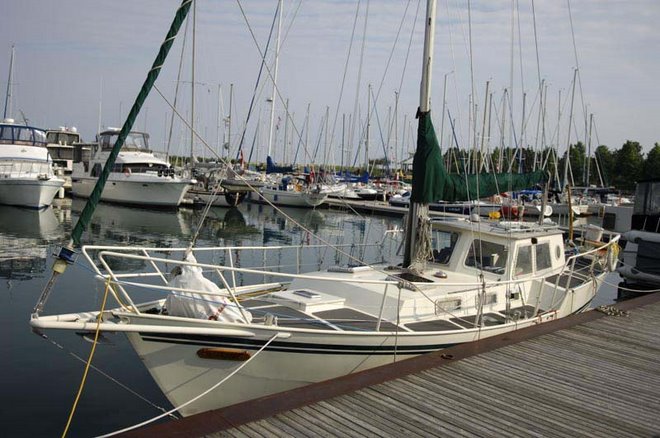 |
| Best to be wearing brown foulies if you can read this. (Image courtesy of NOAA via John C.) |
I have exactly one experience with
weather routing at sea. In 2009, while I was part of the delivery crew for
Bruce and June on Ainia. a Bristol 45.5, Bruce consulted with the very experienced and highly regarded
amateur radio enthusiast and hobbyist marine weather forecaster
Herb Hilgenberg.
As I related here, my skipper would check in with Herb on a pre-arranged schedule and would provide our local weather conditions, a "micro" take on the "macro" high seas forecasts given by the various governmental and for-hire weather routers, from which Bruce also obtained and pored over data in the form of
downloaded GRIB files.
That was the deal: You gave Herb the data points
as he requested them, and not before. Think of a queued-up list of widely separated yachts listening to particular frequencies at particular times, and only speaking when requested to do so. I suspect it was the only way for Herb to keep things straight. Herb treated each boat as if it was a mobile weather station, and thereby collected sea state, wind speed and direction readings available only to a small yacht which would often be sailing perhaps hundreds of miles out to sea. In return,
he gave back his interpretation of weather trends for each vessel's stated area and intended route, plus his considered suggestions as to the least stormy directions in which you could sail.
All this effort was made for
free, since
1987, and with very few days in the year away from the microphone.
Some hobby. Some value. I understand he has taken contributions to offset the cost of his extensive array of equipment and the no-doubt non-trivial amounts of electricity it takes to be a southern Ontario, bungalow-based oceanic radio network.
 |
| Not actually Herb's radio shack, but likely a reasonable fascimile. |
Basically, the H.H. story is of a man who, having sailed and found the forecasting wanting, turned his retirement hobbies of weather forecasting and ham/SSB radio operation into a public service, even if that public, outside of the offshore sailing community, is largely unaware of his existence near the shores of Lake Ontario. H.H. has been directly involved on the comm side in many rescues and has received praise and citations in equal measure. I have heard that some people will not consider departing on deliveries of yachts from the U.S. coast down into the Caribbean without what they consider to be Herb's sage advice.
I met Herb at a Safety at Sea seminar in 2010 in Toronto, and it was slightly surreal to see a rather ordinary looking man of senior years very nearly adored by a small crowd of people wearing clothing usually seen at regattas. Herb's the sort of rock star you become in the cruising community when his is the only voice you can hear over the wind screaming in the rigging and the smell of the crew heaving down the sidedecks.
 |
| Yes, you need all these buttons. |
Recently, I checked out Herb's very 1994-style webpage
to see if there was anything new. He's not a young man, and I wondered if he would still be offering his service when we finally push off for our own adventure. Weather reporting/forecasting,
GRIB files and ship-to-shore communication via
SailMail or an equivalent service are the reasons I purchased a single-sideband radio (
SSB). That particular item will be installed when I restore
Alchemy's mast and will no doubt produce some blogging as SSB installation and tuning is a somewhat information-dense and variable process that rarely goes ideally on the first try.
Books have not only been written about SSB/amateur radio installation and operation on seagoing sailboats, they've been written about
just this model.
 |
| TL Sparks as a name is an inside joke to radioheads. |
|
|
|
Now, there has been
a move toward the use of satellite phones in the cruising community, particularly the
Iridium type, which is considered to have the "largest constellation", i.e. most worldwide coverage. Picture the analogous GPS "constellation": the more satellites in view, the better the confidence in the reported position. Satellite phones work a little differently, and perhaps one day I can get into that. The point here is that they are getting, if not cheap, cheap enough, cheaper than SSB rigs, are familiar in the slightly bulky manner of a circa 1993 cellphone, are portable, and you can speak privately on them AND hook them into a netbook to download weather maps, e-mails and all sorts of data, limited only by your credit limit. There's a whole other level of satellite communications above these phones called
IMMARSAT, but that's beyond the scope and budgets of most cruisers. It is a method, however, of keeping up with
American Idol 1,000 NM from land. It's more or less the standard on commercial ships these days.
So is SSB on cruising sailboats done, antiquated, superannuated? Is it the "landline" or "dumb phone" of small boat communications? Are there apps for it?
Why, yes, there are, and I doubt SSB is done for those who like a variety of tools to solve, in this case, the problem of distance communication on a boat at sea or on the hook in Random Lagoon, population you.
While it can cost three to four grand to get transceiving, apart from a yearly SSB-to-email service fee, it's pretty well free to yak, network and receive
weather faxes. For people cruising with a kid, such as we propose to do, it's a great way to send and receive lessons by email in distant locales (pictures are generally too big and best sent from Internet cafes ashore). Various "cruiser nets" exist and it's a standard method of finding out which seaside facilities are open, which port officials are on the take, and which panga has sunk right at the reef entrance...stuff you won't find in cruiser guides or marked on charts. Yes, it's semi-public, although it can be made pretty private, and yes,
propagation and other technical factors can limit its range and function. And let's not forget that offshore, when you yell MAYDAY on an SSB emergency frequency, every SAR/Coastie in range hears you; with a satellite phone, a single phone rings on a single desk, because you are, after all, just capable of calling one phone number at a time.
Still, many fans of SSB consider it indispensable and
the sat phone something good for the ditch bag. People who like SSB on boats like
weather nets and these familiar voices,
who provide important information, after all, for people living on little boats, are generally trusted.
Trusted too much? The
marine writer Charles Doane would seem to think so. In an
article that seems to be critical of Herb Hilgenberg's forecasting skills, he cites
a few cases suggesting that Herb's forecasting leans toward the conservative side, pinning his "correspondents" to shore instead of profitably being at sea on passage. The comments on Doane's article range from
fairly blunt disagreement and suggestions that Doane is ungrateful, to broad agreement from experienced cruisers that Herb is indeed sometimes wrong or too pessimistic. Herb's reply to Doane on hisown website seems to indicate that this criticism has discouraged him to the point of retirement.
This I would consider a loss to the greater cause of cruising safely.
Frankly, I don't get the criticism of Herb's service. Isn't this akin to saying you don't like the colour of the bookmobile lady's dress and therefore feel disinclined to borrow books? The crossing guard's stupid hat is the reason for your six-block detour? Herb is not a professional, nor does he claim to be. His forecasting is based on careful observation, but he lives down the road from me, near Toronto, some distance from much more than road salt. When he is predicting conditions in Greenland or south of Bermuda, he has the same governmental "macro" charts and forecasts available to him as is available to anyone else through many means. The quality of his "micro" forecasts (the reason sailors have found him useful) is the same for any of his counterparts around the globe: the accuracy and the density of reporting boats is critical. During a race situation such as the
ARC or the
Caribbean 1500, he would have perhaps a dozen boats reporting in to him: a dozen well-staffed and experienced weather stations in effect who understand his needs and can give him current and accurate conditions from which he can build a plausible forecast.
Damned useful it has been, too. But it is only a forecast. Doane suggests later in his article...and were I the writer, I might have led with this..."Herb probably is more conservative than most other weather-routers,
but
all weather-routers are--and should be--inherently conservative {italics mine}. Whether
they're getting paid or not, they can't help but feel responsible for
their clients, and a big part of their job, as they see it, is making
sure those clients understand just how bad things might get on any given
passage."
A small point: In Herb's case, they aren't clients as Herb is not being paid by them. They are helping a guy with his radio and forecasting hobby. Really, no more. You hear Herb and take his advice or do not. Doane continues: "Routers do provide a useful service, but it is not good when sailors
become too dependent on them...Too many sailors these days believe that hiring a weather-router or
joining a rally or bringing some professional crew aboard provides some
kind of insurance, as though the risk they are taking can be hedged or
transferred to others."
Well, now we are getting somewhere.
Don't blame the guy who is better at guessing than (perhaps) you. See "don't shout at the GPS for your crappy navigation". Also, "don't blame the cross-wind for your crappy docking." None of those elements, the forecast, the GPS, the
wind, for Neptune's sake, has a stake in your successful boating. You, the skipper, do. You, the crew, do. Indifferent of objects and nature in general is something in which I personally take comfort. The sea, if approached unwisely, will kill me without a second thought.
Without a first thought, actually. Ocean water is not sentient and is not capable of malevolence. Attributing motives to "evil black boxes" or "menacing greybeards" or "vanishing tethers" is very poetic, but it's poor seamanship. So is taking your helm instructions uncritically from a guy at a radio ashore as if they arrived on properly buoyed stone tablets or a burning bush on a burning liferaft.
Ultimately, whatever forecaster is being consulted is still only capable of offering an opinion or guess at local sea level about what conditions you will be experiencing in the future. The guesses are based or at least formulated in both science and experience, but they are representations of possibility. This is quite different from the view from the helm. You, the skipper, have that viewpoint. It is the
important viewpoint. Listen to other viewpoints, always, but the skipper's judgement must trump all others, and
not just in a legally binding sense. Unless one is impaired, disabled or otherwise required to stand down, the skipper has a moral duty to ensure the safety of vessel and crew. You can't blame others or transfer or cede that authority, in my view, nor should you be tempted to do so.
I suspect that what people see as the "conservatism" of Herb or indeed any weather router (including the paid ones, who may be thereby even more dangerously plausible) is simply the process of maturation at work. The weather titan's proclamation become, with the maturation of the crew as experienced mariners, just one more element in the mix. If Herb learned how to forecast,
most skippers eventually can, as well. And they should, because it is them, on the boat at sea, who have to decide the best direction and the soundest methods for staying safe at sea and arriving alive.
I hope Herb is still working the airwaves when we are out there, and I hope we can consult him as a valued source and in turn, contribute the readings he requires to forecast. But even though I can recognize his voice, I would never assume he was on our boat, nor would I ever assume he had any role or responsibility in either our misfortune or our success. That's on the crew, not the weather guy.
UPDATE, June 14, 2013: Looks like our wish is denied.
Noonsite.com reports that Herb H. has put down the mike.
Thank you, sir, for a valuable and selfless service to the cruising community. Enjoy the absence of static in your ears.


















